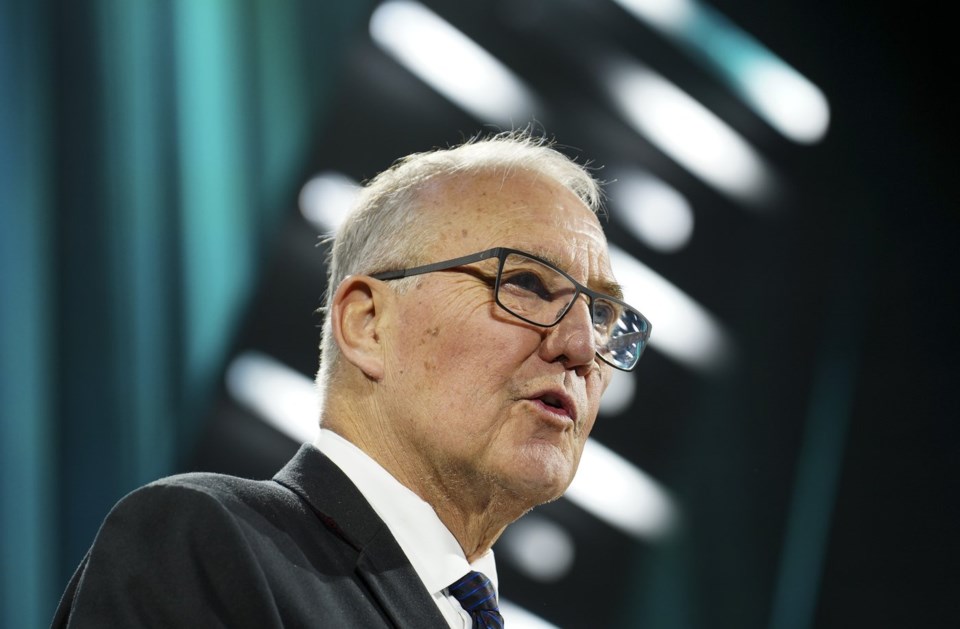OTTAWA — Defence ministers from Canada and China sat down together for the first time in 11 years at an international security conference last week as the countries work to re-establish lines of communication.
Bill Blair met with Admiral Dong Jun on Friday while attending the Shangri-La Dialogue in Singapore, marking the first meeting between the ministers since 2013.
"Communication between our countries is vital and I welcome further opportunities for dialogue," Blair said in a statement posted on X.
Blair said he expressed Canada's concerns about Beijing's foreign interference, its financial and economic support for Russia, and its recent military exercises in Taiwan.
China staged a simulated blockade of the island in late May after the election of a new government that does not accept Beijing's position that Taiwan is part of China.
The subject of China's actions in Taiwan was also raised by U.S. Defense Secretary Lloyd Austin when he met with Dong on Friday, according to Pentagon officials.
That was the first in-person meeting at the ministerial level since contacts between the American and Chinese militaries broke down in 2022 when then-U.S. House Speaker Nancy Pelosi infuriated Beijing by visiting Taiwan.
In recent years Canada has been taking part in U.S.-led exercises in the Taiwan Strait that American officials say are meant to emphasize freedom of navigation through the region's contested waters.
There have been reports of China taking aggressive action during those exercises. Last June, the U.S. released a video showing a Chinese ship cutting across the path of an American destroyer.
Then in October, Blair accused China’s military of unacceptable and unsafe behaviour after a fighter jet came within five metres of a Canadian surveillance plane over the East China Sea.
Canada has pledged to continue to send three navy vessels to the region as part of its Indo-Pacific strategy, which will also see more military co-operation and joint exercises with Indo-Pacific allies.
"We stand ready to engage with China and with all our partners throughout the Indo-Pacific to ensure a stable and secure region," Blair said during his remarks at the Shangri-La Dialogue.
His meeting with Dong is the latest in a series of high-level discussions that suggest relations between Canada and China are improving after years of strain.
Foreign Affairs Minister MĂ©lanie Joly spoke with her Chinese counterpart Wang Yi in January, and the pair met in person in February.
Also in January, a top Canadian military official, Maj.-Gen. Gregory Smith, told members of Parliament that Ottawa was looking to re-establish relationships with China’s defence attaché. He also noted Canada has not completed any military exercises or co-operated with the People’s Liberation Army since 2018.
That was the same year Huawei executive Meng Wanzhou was arrested in Vancouver as part of a U.S. extradition case. China responded by detaining Canadians Michael Kovrig and Michael Spavor in what is widely seen as retaliation.
Diplomatic relations were strained for years while Meng and the Two Michaels remained in custody. Meng was released in September 2021, and Kovrig and Spavor returned to Canada shortly after.
Starting in late 2022, Global News and the Globe and Mail published a series of stories based on leaked intelligence information that alleged Beijing attempted to meddle in Canada's 2019 and 2021 federal elections. The scandal eventually resulted in a public inquiry, which released an interim report in early May.
Commissioner Marie-Josee Hogue found the attempted interference did not affect the overall results of the two elections or undermine the integrity of the electoral system.
Her report found it was possible the outcomes of races in a small number of ridings were affected by meddling, and singled out two instances of individual races where Beijing is alleged to have tried to influence the outcome. Hogue said there wasn't enough evidence to draw conclusions about what actually happened in either case.
The interim report noted there have been intelligence warnings about Beijing's efforts to influence the Chinese diaspora in Canada as far back as the 1980s.
This report by The Canadian Press was first published June 2, 2024.
— With files from The Associated Press
Sarah Ritchie, The Canadian Press




